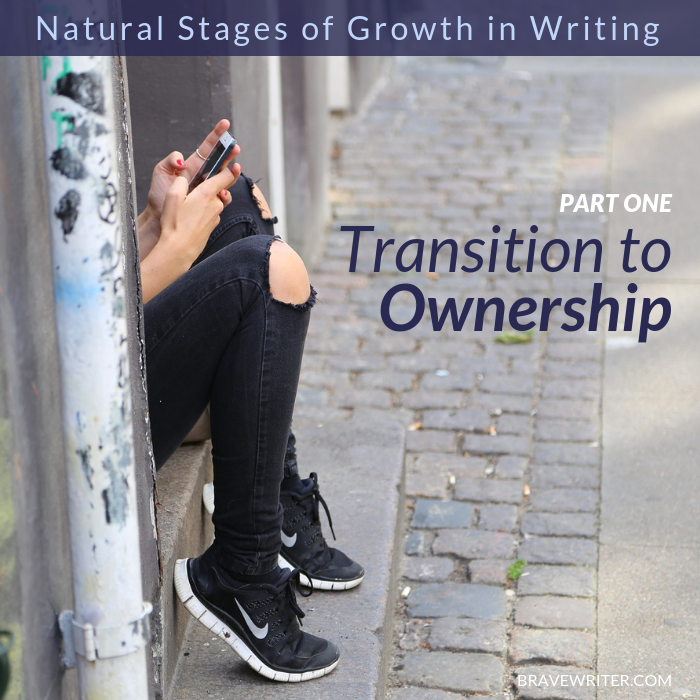Podcast: Transition to Ownership—Part 1

This is our first of a two part discussion of the Transition to Ownership stage of writing growth. This is the time when your 13-14 year olds (8th-9th graders) are making the somewhat treacherous journey from adorable, fact-centered child to rhetorical imagination (the awareness that the world is inhabited by unlimited numbers of perspectives). Noah helps me make this discussion especially engaging.
We’re having a great time making these podcasts (we hope many of you are listening). Share them around, please! I find myself utterly charmed by the chance to express all this build up of thinking I’ve cultivated over years of writing instruction and ponderings.
Julie
Quick footnote: there are a couple of gaffes – the way there are when you record yourself mid-roll talking. For instance, I say “posterior” baby when I mean “post-term”! 🙂
To help grow writers at this stage, Help for High School is a self-study program written for and to teens, and the Boomerang provides teens with continued copywork and dictation practice—as well as quality literature to read and examine.
The Transition to Ownership bundle combines Help for High School and The Boomerang at a discount!
Ready for more?
Below are links to the complete Stages of Growth in Writing podcast series.
Jot It Down!
Partnership Writing
Faltering Ownership
Transition to Ownership Part 1
Transition to Ownership Part 2
Eavesdropping on the Great Conversation


















Another terrific podcast!
I can hardly wait for the second part.
Noah brings so much insight to the table, seeing as he was trained by what you teach. Lovely!
P.S. I did the same thing as you did (taught myself how to draw with Betty Edward’s book)
It is fun listening to you two laugh and chat together. Keep the podcasts coming.
I’m just chuckled at your note about the gaff…didn’t even think twice about “posterior” since my special needs son was posterior and has had lots of issues 🙂
Julie — Thanks so much for these! I just posted a link to them on our homeschool website for those whose students will be in my classes next year. Thanks, Kellie
Thanks Kellie! Feel free to post your website here for others to enjoy too.
Julie
count me as official Listener #6!
these podcasts are great! it’s wonderful to hear and experience the relationship you and Noah have. it’s wonderful to hear first hand just how the Brave Writer Lifestyle plays out.
our children are young yet. we are just beginning. but i feel like these podcasts are life lessons–not just in writing or homeschool success, but also in parenting and developing real, respectful, long-lasting connections with our children.
thank you.
[…] the Transition to Ownership in podcast 06 and this is the second half of that conversation. You’ll want to listen to that half first. We continue our discussion of your role in the “Big Juicy Conversations” you need to […]
[…] Transition to Ownership: Part One […]
Thank you enormously for these podcasts. Even though I have the WJ, your explanation of the stages clarifies a lot to me.
One question: my son is 14 and based on your explanation is definitely in the transition stage. I also have an 11 yo who is starting to get there (a bit sooner than her 14yo sibling did) and two small ones running around. What I need is some structure for a daily writing routine: my 14yo complains that she never knows what to do for writing. And she’s right: sometimes I tell her copywork is OK, sometimes I tell her to write a narration or copy a poem or write her thoughts on the history story we just read. In the ideal situation we all sit together with the teapot on the table and the little ones colouring or playing legoes, but that happens less often than we all would like. With the little ones we can’t have the lovely long uninterrupted talking and writing afternoons as often as we used to have.. We did some freewrite, boomerang and arrow, but as I said, I need some routine (haven’t listened to the One Thing podcast yet, may e that one will help too :-)). The ideas and planning of the Partnership Writiting look very nice to me, but I’m not sure if my older ones are already ‘too old’ for it. Based on the sample I think Help for Highschool offeres less of a routine. What do you think would be best in our situation?
Try using the routine laid out in the PW (and instead of doing PW activities, pick your own writing ideas or use Help for High School – which is easy to use—each module lasts about a week).
You want to have a weekly format and the PW routine gives it to you. then your kids can know how often copywork and dictation, how frequently they will freewrite, what stage of development a writing project ought to be in each week, and so on. You won’t hit everything every week every month. But you can always return to the routine when you need to and it will reassure you that you are on track.